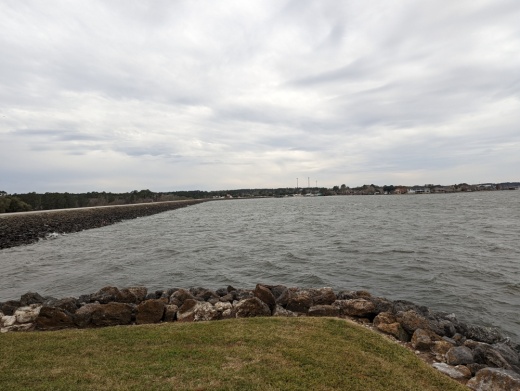UPDATED April 28, 12:30 p.m.
Conroe mayor Jody Czajkoski praised the Ninth District Court of Appeals' April 21 decision in a statement released April 27, ruling that the San Jacinto River Authority failed to mediate with the cities of Conroe and Magnolia before filing suit in collecting payments through its Groundwater Reduction Plan contracts.
"This is a monumental victory for the water users of this city, and we are happy to say we have $4.8 million coming back to help and your Mayor and Council will continue to fight for our customers."
Conroe's city administrator Steve Williams said the money could help the city continue its maintenance of its own water infrastructure.
"Make no mistake, this is a historic victory for the water users of the city of Conroe," Williams said in the April 27 statement. "The money could go straight back to improving the water and sewer systems and relieving the rate pressure for our customers."
The SJRA confirmed to Community Impact Newspaper on April 21 that it would attempt an appeal to the Texas Supreme Court.
ORIGINAL STORY:
The Ninth District Court of Appeals in Beaumont issued an opinion April 21 upholding a lower court’s decision against the San Jacinto River Authority. The memorandum opinion, delivered by Judge Leanne Johnson, found that the river authority failed to mediate with the cities of Conroe and Magnolia before filing to collect payments in its Groundwater Reduction Plan contracts. The opinion upheld a decision made in Montgomery County's 284th District Court.
"[The] SJRA failed to plead facts showing compliance with the required presuit mediation outlined in the GRP contracts and failed to meet the requirements of subsection 271.154 [relating to the cities' right to mediation]," Johnson wrote in the court's memorandum opinion.
The SJRA’s General Manager Jace Houston confirmed in an emailed statement to Community Impact Newspaper that the river authority would appeal the decision.
“We disagree with the court’s reasoning, and we’re obviously disappointed with the ruling because it just prolongs the process of collecting the unpaid amounts that are owed under the contract,” Houston said. “We’ve been in discussions with Conroe for many years, and we will obviously continue those discussions while we appeal the court’s decision.”
The SJRA is one of 10 river authorities created by the state legislature to develop water supply and wastewater management in the San Jacinto River Basin, excluding Harris County. The SJRA is a nontaxing entity, according to its website.
The Groundwater Reduction Plan contracts took effect in 2015 after Montgomery County’s Lone Star Groundwater Conservation District enacted limits on groundwater pumping in 2008, before the groundwater district’s board was changed to an elected membership. The contracts would allow the SJRA to draw surface water from Lake Conroe, treat it and sell it to cities and utilities in Montgomery County, according to the SJRA’s website.
In its opinion, the Ninth District Court noted the SJRA could legally set rates that allowed it to repay bonds used to finance the GRP project but did not offer a further opinion.
Case background
According to the Ninth District Court’s opinion, the April 21 ruling stemmed from a March 2019 suit filed in Montgomery County’s 284th District Court against the SJRA by six private water and sewer companies: Quadvest, Woodland Oaks Utility, Everett Square, E.S. Water Consolidators, Utilities Investment Co. Inc., and T&W Water.
The private companies alleged that the SJRA had charged excessive pumping fees, violating the GRP contract provision requiring pumping fees to be set at a rate that neither benefited nor punished the consumer.
The SJRA filed an appeal and a cross-claim against Conroe and Magnolia—although the cities were not named in the original suit, according to the Ninth District Court—in March 2020. The river authority asked for a waiver of the cities’ governmental immunity—a legal protection from lawsuits in the Texas Local Government Code—alleging that Conroe and Magnolia breached their GRP contracts for fiscal years 2017-2020.
In a press statement, Quadvest CEO Simon Siqueira celebrated the April 21 ruling. The six water and sewer companies were not named in the SJRA’s March 2020 cross-claim, and the river authority attempted to separate its claims against the cities from its claims against the private companies, but the 284th District Court denied its motion.
“While Quadvest was not directly involved in this lawsuit, the results tell us what we have been saying for years—the cities of Montgomery County and Quadvest will resolve this water tax issue, and we will prevail,” Siqueira said.
Quadvest also said in its statement that it would continue to not pay the SJRA its GRP fees and that the money would be set into a separate account in the hope of being able to refund customers.
Previous lawsuits
In March 2020, the Texas Supreme Court ruled in a separate case that the SJRA’s GRP contracts were “incontestable and valid,” and that cities could not use governmental immunity as protection from lawsuits against complaints of breach of contract. Community Impact Newspaper previously reported. However, the court also ruled that the SJRA could not use an expedited action to validate its rates.
That opinion stemmed from a suit the SJRA filed against the city of Conroe in Travis County, following rate increases in 2017. Conroe and Magnolia city councils passed resolutions condemning the increase, and city officials refused to pay.
The Supreme Court sent Conroe and the SJRA back to a trial court to resolve its rate issues.
The Ninth District Court of Appeals' April 21 opinion can be viewed in full here:





